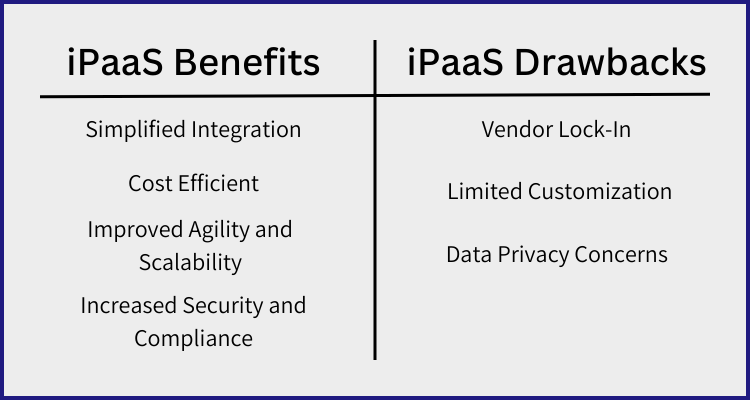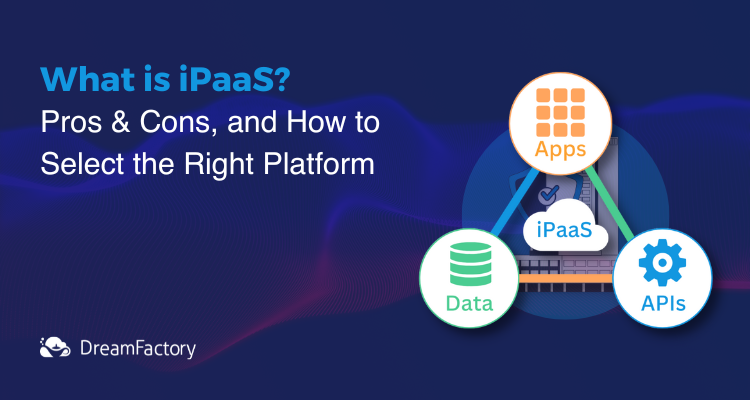Businesses are always looking for new and innovative ways to improve their workflow. One way to do this is by using iPaaS solutions (integration Platform as a Service). iPaaS is a platform that allows businesses to integrate different applications, making it easier for employees to share data and collaborate. This article will discuss what iPaaS is, its benefits, and some of the top providers in the industry.
What is iPaaS?
iPaaS is a platform as a service (iPaaS) that enables users to integrate multiple applications using connectors, APIs, and code. It can help organizations automate business processes and dataflows, and iPaaS also helps companies migrate data between different applications and systems. This can improve the efficiency of businesses by making it easier for employees to share data and collaborate.
Benefits of iPaaS
As businesses undergo digital transformation, they can rely on integration software to help ease their transition. Here's a chart for quick reference of iPaaS benefits and drawbacks.

We'll also go in depth on some of the benefits and drawbacks of iPaaS solutions.
Simplified Integration
iPaaS allows users to simplify integration by providing a centralized, cloud-based platform that enables organizations to connect, integrate, and manage various applications, data sources, and systems. It streamlines the integration process through several key features and capabilities, such as pre-built connectors and templates, user-friendly drag-and-drop interfaces, and centralized management dashboards. iPaaS platforms promote standardization by using common data formats and protocols, ensuring that different applications and systems can communicate effectively.
These platforms are designed to be easily scalable and flexible, allowing businesses to adapt to changing requirements and grow their integration infrastructure as needed. Automation and orchestration features help handle complex workflows and processes, while support for both real-time and batch processing caters to various data processing requirements. Ultimately, iPaaS platforms enable organizations to reduce the complexity of integration and achieve seamless connectivity between various applications, data sources, and systems.
Cost Efficient
iPaaS offers cost efficiency for organizations by eliminating the need for significant investments in hardware and infrastructure associated with traditional integration solutions. As a cloud-based service, iPaaS operates on a pay-as-you-go model, allowing businesses to scale their integration needs according to their requirements and only pay for the resources they use. This approach reduces upfront capital expenses and lowers ongoing operational costs.
Additionally, iPaaS platforms simplify the integration process by providing pre-built connectors, templates, and user-friendly interfaces, which reduces the reliance on specialized IT staff and minimizes the time and effort spent on integration tasks. By streamlining these processes, organizations can allocate resources more effectively and focus on their core business functions. In summary, iPaaS delivers cost efficiency by providing a scalable, flexible, and easy-to-use platform that reduces both capital and operational expenses associated with application and data integration.
Improved Agility and Scalability
iPaaS helps improve agility and scalability by providing organizations with a flexible and easily adaptable cloud-based integration platform. Agility is achieved as iPaaS enables businesses to swiftly respond to changing market conditions, customer demands, and evolving technology trends. The user-friendly interfaces, pre-built connectors, and templates offered by iPaaS platforms allow for rapid configuration and deployment of new integrations, ensuring organizations can quickly adapt to new requirements.
Scalability is enhanced as iPaaS platforms are designed to accommodate growth and handle increasing workloads efficiently. By using a cloud-based infrastructure, organizations can seamlessly scale their integration capabilities in line with their business needs without worrying about the limitations of on-premises hardware and resources. This flexibility allows for the addition, modification, or removal of connections between applications and systems as needed, ensuring the integration infrastructure remains aligned with the organization's objectives.
Increased Security and Compliance
iPaaS helps improve security and compliance by offering built-in security features such as encryption, data protection, and secure data transfer. Providers often maintain compliance with industry standards and regulations, ensuring sensitive data is handled responsibly. By centralizing integration processes, iPaaS allows organizations to consistently enforce security policies and manage access controls across their entire integration infrastructure, further enhancing data protection and regulatory compliance.
Drawbacks of iPaaS
Vendor Lock In
Vendor lock-in refers to the potential difficulty an organization may face when trying to switch from one iPaaS provider to another or move to an alternative integration solution. This issue can come up due to several factors:
- Proprietary technology: iPaaS providers often use proprietary connectors, templates, and tools that may not be compatible with other platforms. When an organization decides to switch providers, it may have to rebuild or reconfigure integrations from scratch to accommodate the new platform's specific requirements.
- Data migration challenges: Moving data and integrations between different IPaaS providers may involve complex and time-consuming data migration processes, which can be disruptive to ongoing business operations.
- Integration complexities: Each iPaaS platform has its unique approach to handling integration, such as data transformation, mapping, and error handling. Changing providers may require an organization to re-learn and adapt to a new platform's methodologies, which can be resource-intensive and time-consuming.
Limited Customization
Limited customization caused by iPaaS solutions are potential constraints an organization might face when trying to tailor the integration platform to meet their specific needs or address unique use cases. While iPaaS providers offer pre-built connectors, templates, and tools to simplify the integration process, these out-of-the-box solutions may not always cover every scenario or cater to all requirements.
Data Privacy Concerns
Data privacy concerns related to iPaaS solutions stem from the fact that organizations transfer and process sensitive data through third-party cloud services. Some key concerns include:
- Unauthorized access: Potential risk of unauthorized access to sensitive data by external actors or even the iPaaS provider's staff.
- Data breaches: Vulnerability to data breaches or leaks due to inadequate security measures or platform vulnerabilities.
- Compliance challenges: Meeting regulatory requirements for data privacy, such as GDPR or HIPAA, while utilizing third-party cloud services for integration.
Tips for choosing an iPaaS platform
When choosing an iPaaS vendor, it's crucial to consider several factors to ensure the platform aligns with your organization's needs. First, prioritize ease of use, opting for a low-code platform that allows quick and straightforward application connections without requiring skilled developers. Flexibility is also an essential point to notice, as the platform should adapt to changing business needs, support various data types, and accommodate different integration patterns.
Scalability is also a critical consideration, as the platform must efficiently handle increased traffic and user growth without disruptions. Security features, such as centralized data access control, encryption, and user authentication, are vital for safeguarding sensitive information. Additionally, make sure the platform complies with relevant regulations like GDPR to protect data privacy.
Take into account the types of applications you wish to integrate, as not all iPaaS platforms support every application. The chosen platform should be compatible with the specific applications you need to connect. Assess the size and complexity of your organization to determine whether a more robust iPaaS platform is necessary. Choose one that can effectively handle your business's scale and complexity.
Your budget is another crucial factor, as platforms vary in price. Select one that fits your financial constraints and ensure you understand the pricing structure before committing. Consider the level of support you need, such as technical support, training, live chats, or consulting services, and choose a platform that provides the appropriate level of assistance. Also, ensure the platform includes the features you require, like data transformation, workflow automation, and connectivity to cloud-based applications.
How DreamFactory can help
DreamFactory is a leading iPaaS provider that offers a complete solution for integrating different applications. We offer a wide range of integration solutions, including:
Flexibility
DreamFactory is a one-stop-shop for businesses that want to incorporate every tool under the sun. Whether it's sales software or customer engagement platform, DreamFactory has you covered for any use cases with its wide variety of integrations and seamless connections between them all.
High Performance
DreamFactory is the perfect fit for businesses that need their site to be scalable. With DreamFactory's multi-tenant support, your site will be able to handle any traffic or data spikes without breaking a sweat.
Security and Compliance
DreamFactory is committed to keeping your data safe and secure. We offer HIPAA and SOC-II compliance so you can have peace of mind knowing your data is always protected.
Create unlimited APIs
Creating APIs can be a time-consuming process, but with DreamFactory, you can create as many APIs as you need within a single ecosystem without any additional coding or configuration. This API management saves you valuable time and resources, so you can focus on other areas of your business.
Pipeline automation
DreamFactory allows your business to automate the transfer of data between different apps. This can save you time and money on manual labor costs and ensure that your data is always up-to-date.
On-premises or cloud-based
DreamFactory may be used on-premises or via cloud integration, giving you the flexibility to choose the deployment option that best meets your needs. You'll get the same high-quality features, functionality, and support no matter which option you choose between in-house and cloud services.
Conclusion
iPaaS is a powerful tool that can help businesses connect applications, automate business processes, and generate reports and analytics from data spread across different systems. DreamFactory is a leading iPaaS provider with many features and connectors for popular applications.
Get started with DreamFactory today with a free 14 day trial!
Read More:
As a seasoned content moderator with a keen eye for detail and a passion for upholding the highest standards of quality and integrity in all of their work, Spencer Nguyen brings a professional yet empathetic approach to every task.
























 Blog
Blog
